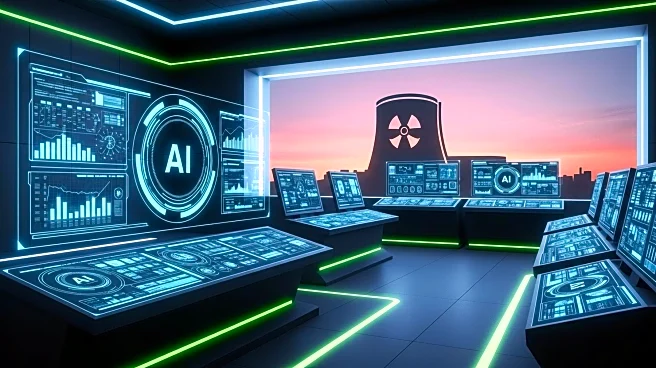What's Happening?
The nuclear power industry is experiencing significant challenges despite efforts to integrate artificial intelligence (AI) into its operations. According to Amory Lovins, an engineering professor at Stanford and cofounder of RMI, the industry is undergoing a slow-motion collapse, as documented in the World Nuclear Industry Status Report. Despite claims that past failures will not recur, many politicians have been convinced to support nuclear investments that private capital markets have rejected. This includes weakening safety regulations and promoting military reactor projects as national security imperatives. However, nuclear power remains expensive and slow to develop, with new designs still facing safety concerns. The industry is attempting to position itself as essential for AI data centers, but this strategy is unlikely to succeed given the competitive edge of renewable energy sources.
Why It's Important?
The challenges facing the nuclear power industry have broader implications for U.S. energy policy and economic strategy. The reliance on nuclear power for AI data centers is being questioned, as renewables are proving to be more cost-effective and reliable. This shift could impact the future of energy investments and the role of nuclear power in the U.S. energy mix. The industry's struggle to compete with renewables highlights the need for policymakers to reassess the viability of nuclear energy as a sustainable option. The potential failure of nuclear power to support AI growth could lead to stranded investments and a reevaluation of energy priorities, affecting stakeholders across the energy sector.
What's Next?
The nuclear power industry may face increased scrutiny and pressure to adapt to changing market realities. As renewables continue to outperform nuclear power in terms of cost and capacity, the industry might need to innovate or risk further decline. Policymakers and industry leaders may need to explore alternative strategies to support AI data centers, potentially focusing on renewable energy solutions. The ongoing debate over nuclear power's role in the energy landscape could lead to shifts in federal policy and investment priorities, influencing the future direction of U.S. energy infrastructure.
Beyond the Headlines
The nuclear power industry's challenges also raise ethical and environmental concerns. The potential increase in nuclear waste and the risks associated with nuclear energy highlight the need for responsible management and regulation. The industry's reliance on subsidies and political influence underscores the importance of transparency and accountability in energy policy. As renewables gain traction, the cultural perception of nuclear power may shift, affecting public confidence and support for nuclear projects.










